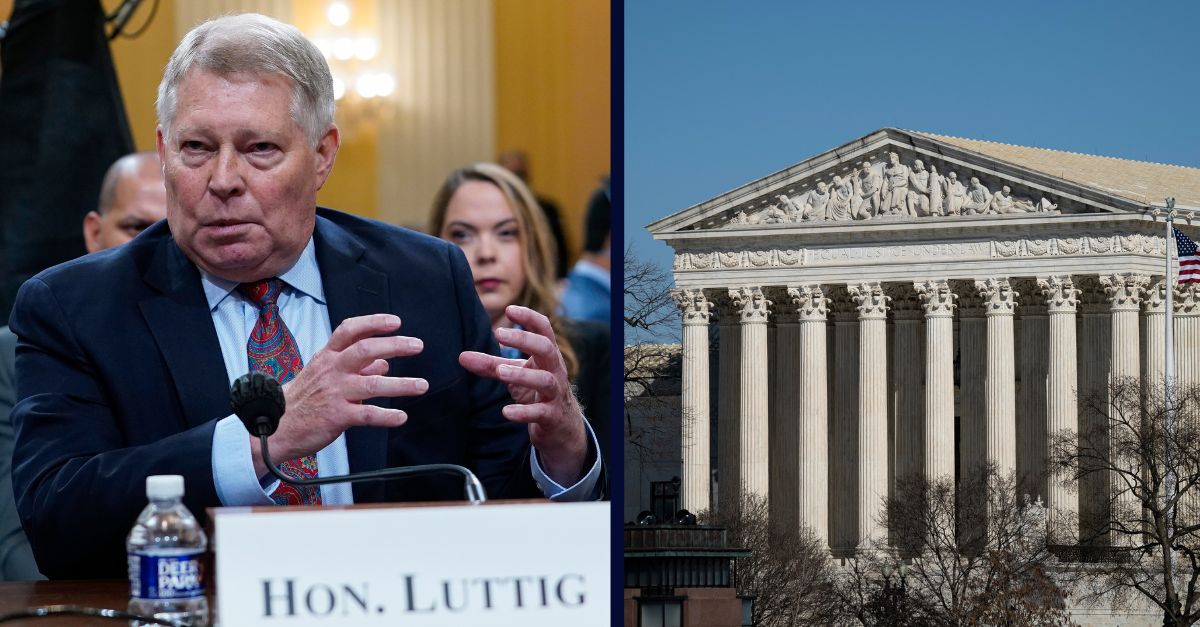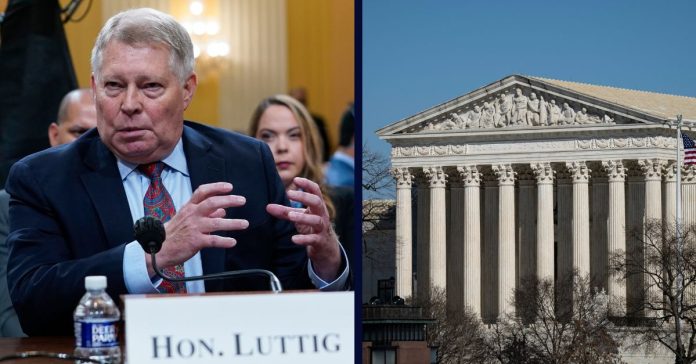
Left: Michael Luttig, a retired federal judge who was an adviser to former Vice President Mike Pence, testifies as the House select committee investigating the Jan. 6, 2021, attack on the Capitol holds a hearing at the Capitol in Washington, Thursday, June 16, 2022. (AP Photo/Susan Walsh). Right: A general view of the U.S. Supreme Court, in Washington, D.C., on Thursday, February 29, 2024. (Graeme Sloan/Sipa USA)(Sipa via AP Images).
A retired conservative judge known for his outspoken defense of the Constitution has urged the Supreme Court to keep things exceedingly simple next month when they debate controversial language within a criminal statute brought against hundreds of Jan. 6 rioters as well as Donald Trump in his election subversion case in Washington, D.C.
Joined by former lawmakers and a long list of former acting attorneys general and legal advisers to numerous federal agencies, retired U.S. Circuit Judge Michael Luttig — who only last month beseeched the high court to disqualify Trump from the ballot in Colorado because he engaged in insurrection — expends 29 pages urging justices to cast aside superfluous language and invoke the “plain meaning” of words at issue in the case of Fischer v. United States.
That case, as Law&Crime previously reported, will be heard on April 16.
It stems from a challenge brought by Jan. 6 rioter and former police officer Joseph Fischer of Pennsylvania. Fischer was arrested and indicted on several charges including a federal obstruction charge known as 18 U.S.C. § 1512(c) (2).
That statute states:
Whoever corruptly alters, destroys, mutilates or conceals a record, document or other object, or attempts to do so, with the intent to impair the object’s integrity or availability for use in an official proceeding; otherwise obstructs, influences, or impedes any official proceeding or attempts to do so, shall be fined under this title or imprisoned not more than 20 years, or both.
When his case was before U.S. District Judge Carl Nichols, a Trump appointee, Fischer argued successfully that the charge was misapplied to him because the statute only extended to a defendant taking some sort of action toward an official record or document — not the congressional certification of an election.
Nichols agreed to dismiss the count — the first of the federal judges overseeing Jan. 6 cases to do so — but the Justice Department appealed and then won at the U.S. Court of Appeals, 2-1. Appellate judges sided with prosecutors: the statute covered congressional proceedings as well as documents. Fischer raised the question to the Supreme Court, and the justices agreed in December to hear the case.
Now, as those oral arguments bear down and as the court rules favorably for Trump — justices unanimously left him on the Colorado primary ballot and agreed to debate whether he is immune from criminal prosecution — Luttig’s brief heralds a dire need for constitutional originalism and textualism in the impending case that could end up shaving off at least two counts in Trump’s indictment in Washington, D.C.
Focusing on the word “otherwise,” in the section of the statue that reads, “otherwise obstructs, influences, or impedes any official proceeding or attempts to do so,” the amici filers contend the plain meaning of “otherwise” is clear.
“Unlike in the world of Alice and Wonderland, in a statute the meaning of a word should not be its antonym. An antonym of ‘otherwise’ is ‘similarly,”” the brief states before going on to quote none other than Lewis Carroll’s Through the Looking Glass.
“‘When I use a word,’ Humpty Dumpty said in a rather scornful tone, ‘it means just what I chose it to mean — neither more nor less,’” the brief recalls. “‘The question is,’ said Alice, ‘whether you can make words mean so many different things.’”
”The question is,’ said Humpty Dumpty, ‘which is to be master — that’s all,’” the filing continues.
Using plain logic, the brief argues, the obstruction charge of U.S.C. § 1512(c) (2). therefore cannot be interpreted by the justices to mean it is limited only to conduct corruptly obstructing, influencing or impeding an official proceeding in the way Fischer argues it pertains only to the spoiling of documents.
The literal dictionary definition of the word “otherwise” and its strongest synonym — “differently” — make the argument against Fischer’s claims “dispositive,” Luttig and his fellow scholars claim.
“‘A fundamental rule of textual interpretation is that neither a word nor a sentence may be given a meaning that it cannot bear,’” the group continued, invoking the words of Justice Antonin Scalia in his 2012 tome, “Reading Law: The Interpretation of Legal Texts.”
Justice Scalia also concurred in 2008’s Begay v. United States that the common and correct interpretation of the word “otherwise,” clearly meant “in a different way or manner.” And this was especially so when the term was used in a statute criminalizing more than just one act.
A straightforward analysis compels one to reach that conclusion, Scalia argued at the time. Trying to limit the acts after the word “otherwise” in a statute to “acts similar in kind” would be to “write a different statute,” he found.
In the Begay case, Justice Samuel Alito, then Justice David Souter and Justice Clarence Thomas dissented but agreed on that point.
Luttig and his fellow amici also contend that he high court itself uses the word “otherwise” regularly and in its most common-sense understanding.
The amici brief also pushes back against other questions Fischer raised in his petition to the court, like the maximum allowable prison sentence on the charge of 20 years.
“That is for Congress to decide,” Luttig writes, not Fischer.
The other question Fischer raises is one asking whether the executive branch can distinguish between those who stormed the Capitol to prevent a peaceful transfer of power and those who may have corruptly obstructed congressional proceedings “with lesser consequences.”
“Keeping the Republic given to us by our Constitution supports strong deterrence of criminal efforts to prevent the peaceful transfer of executive power,” Luttig wrote.
In that vein, the retired judge also asked the court to ignore portions of an amici brief filed on behalf of Fischer, namely, a suggestion that any punishment for invading the Capitol, particularly those who did not engage in violence, should be no more than six months to a year in jail.
“This ignores that petitioner allegedly used force,” Lutting wrote.
Fischer was charged with assaulting police as well as disorderly conduct on Jan. 6.
“Our Republic substitutes proceedings for might makes right. Without unobstructed proceedings, there is no rule of law and no constitutional system of government,” the amici brief states. “As Justice Homes wrote in the Leo Frank case, ‘[m]ob law does not become due process law by security the assent of a terrorized [decision-making body.]’”
Mercy and leniency both play an important role in America’s criminal justice system, the judge continued, but here, when it comes to this obstruction statute, there shouldn’t be much debate.
“This court cannot rewrite it because the potential maximum prison term is longer than the members of this Court might have enacted if they had the legislative power,” he wrote.
Jan. 6 is not the same as episodes of civil unrest in the nation’s past nor is it the same as sit-in protests at the Capitol or the interruption of a congressional hearing as Fischer contends.
Jan. 6 was “an invasion sought to prevent the peaceful transfer of executive power after an election,” and the transfer of power is not an “everyday activity on Capitol Hill.”
“If America ever allowed the powerful impulse of might makes right to prevail over the peaceful transfer of power, we would have failed to keep our Republic,” Lutting said.
The justices don’t need to twist themselves into knots looking for a remedy the Constitution has “ever-ready,” he added.
“The people can elect a different Congress and President. Together, the new Congress and President can amend the statute. Individually, the President can direct an end to the disparate enforcement and pardon or commute the sentences of prior offenders. The remedy is not for this Court, in violation of the separation of powers, either to rewrite the statute or to transfer to the Judiciary the prosecutorial discretion that Article II vests in the executive branch,” the brief states.
Joining Luttig in the brief was former U.S. House Rep. Barbara Comstock of Virginia; John Danforth, a former U.S. senator and onetime Missouri attorney general; Mickey Edwards, a former Oklahoma state representative and founding trustee of the Heritage Foundation; Wayne Gilchrest, a former longtime U.S. Representative for Maryland; John LeBoutillier, former New York state representative; former U.S. Rep. Reid Bibble of Wisconsin and others.
Other authors to the brief include former acting attorney generals, U.S. attorneys, onetime advisors to entities like the White House, the Justice Department, the Office of Legal Counsel, the Department of Labor, the Department of Education, the Department of Homeland Security, the Department of State, the U.S. Army, the United Nations and more.
Have a tip we should know? [email protected]

